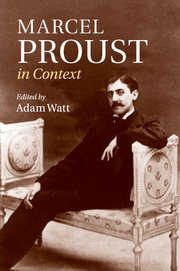Book contents
- Frontmatter
- Contents
- List of Illustrations
- Notes on contributors
- Figure I. Marcel Proust, portrait in oils by Jacques-Émile Blanche, 1892
- Preface
- Figure 2. Proust photographed on his death-bed by Man Ray, 1922
- Note on the text
- Chronology
- Part I Life and works
- Part II Historical and cultural contexts
- i. The arts
- ii. Self and society
- Chapter 14 Freud and psychoanalysis
- Chapter 15 Sexuality
- Chapter 16 Health and medicine
- Chapter 17 Technology and science
- Chapter 18 Religion
- Chapter 19 Travel
- Chapter 20 Journalism
- Chapter 21 Politics and class
- Chapter 22 The Dreyfus Affair
- Chapter 23 The First World War
- Part III Critical reception
- Further reading
- Index
- References
Chapter 22 - The Dreyfus Affair
from ii. - Self and society
Published online by Cambridge University Press: 05 November 2013
- Frontmatter
- Contents
- List of Illustrations
- Notes on contributors
- Figure I. Marcel Proust, portrait in oils by Jacques-Émile Blanche, 1892
- Preface
- Figure 2. Proust photographed on his death-bed by Man Ray, 1922
- Note on the text
- Chronology
- Part I Life and works
- Part II Historical and cultural contexts
- i. The arts
- ii. Self and society
- Chapter 14 Freud and psychoanalysis
- Chapter 15 Sexuality
- Chapter 16 Health and medicine
- Chapter 17 Technology and science
- Chapter 18 Religion
- Chapter 19 Travel
- Chapter 20 Journalism
- Chapter 21 Politics and class
- Chapter 22 The Dreyfus Affair
- Chapter 23 The First World War
- Part III Critical reception
- Further reading
- Index
- References
Summary
In Le Temps retrouvé, Proust's Narrator complains about politics invading the space of literature. Thus writers who put before the demands of literature the search for justice, as in the Dreyfus Affair, or the advocacy of national unity in the context of the First World War, are rebuked by the Narrator: ‘How many . . . turn aside from writing!’ (6: 233; iv, 458). While this could be read biographically as the view of an author long embarked on a career of literary production, the forthright defence of the claims of literature belies the fact that the younger Proust responded with some urgency to major political events of his day. Thus in a letter of December 1919, a quarter of century after Dreyfus's initial conviction, Proust could still boast of his early role as an active defender of Dreyfus, who had been found guilty of spying for Germany in December 1894: ‘My signature was on the very first of the pro-Dreyfus lists and I was an ardent Dreyfusard, sending a copy of my first book to Picquart in the Cherche-Midi prison’ (Corr, xviii, 545).
The representations of the Dreyfus Affair in Proust's work are to be found principally in Jean Santeuil and À la recherche du temps perdu and they demonstrate a significant evolution in response, from the campaigning eagerness of the early novel to the retrospective consideration in the Recherche of a crisis, the intensity of which had been substantially diminished by the time of composition of the novel. Proust was an early believer in the innocence of the Jewish captain from Alsace who was humiliatingly stripped of his military rank at a degradation parade in January 1895 and imprisoned on L'Île du Diable. He worked to secure the support of Anatole France for the Dreyfus cause and in a letter of January 1899 congratulated the high-profile novelist on his intervention (Corr, ii, 272).
- Type
- Chapter
- Information
- Marcel Proust in Context , pp. 167 - 173Publisher: Cambridge University PressPrint publication year: 2013

